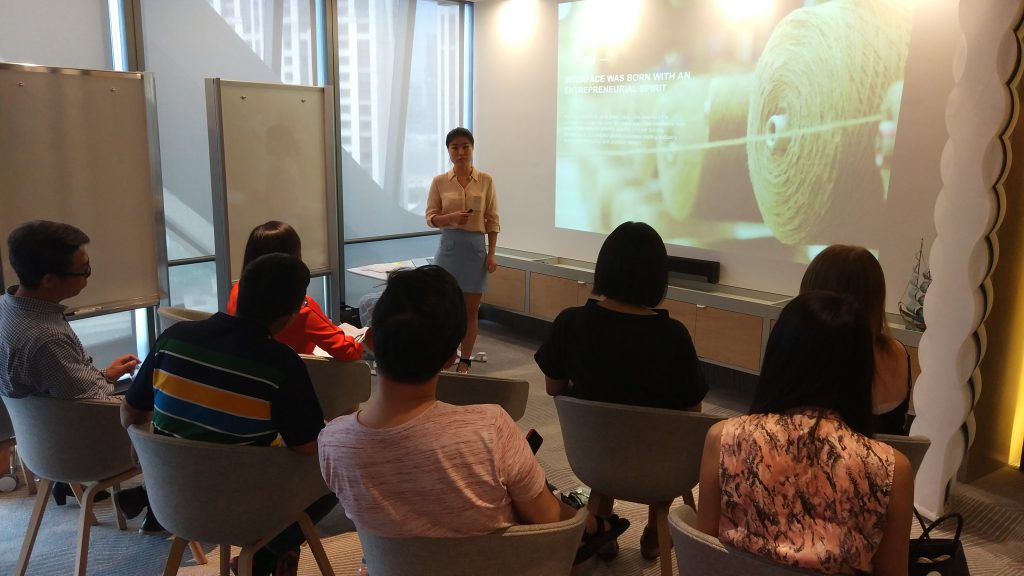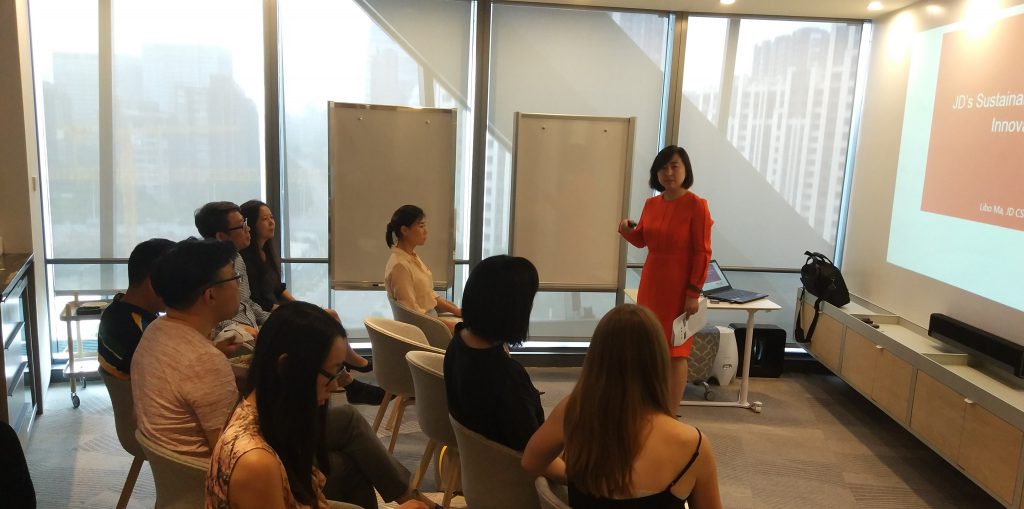Last Thursday, Collective Responsibility hosted it’s Beijing session on “Closing the Loop on Waste” to look at how China is managing its growing supply of waste, the implications for business, and to share some best practices for how firms in the retail and manufacturing sector are closing the loop in China.
Joining the session, we had Libo Ma, Director in Corporate Culture, Employee Engagement and Sustainability at JD.com, and Gloria Niu, China Sustainability Manager at Interface, who spoke to the room of cross-industry professionals about their circular economy initiatives in China.

Gloria shared the story of Interface, a global carpet manufacturer, whose founder Ray Anderson sought to clean up their industry through Mission Zero – a strategy to eliminate any negative impact in their value chain by 2020.
She explained the technical breakdown of a typical carpet tile with the different materials used for each layer, and their reliance on oil – a reliance Ray Anderson wanted to break away from.
The textile industry has many environmental issues associated with it, with waste being one of the most significant. However, since 1994 Interface has already managed to reduce the amount of waste to landfill by 91%, and through innovative technologies, now uses 50% of recycled or bio-based materials.
Gloria then spoke about two of their programs to achieve these goals – Re-EntryTM which collects old carpet tiles from customers after 10-15 years (or when a company moves office), and then fully recycles them into brand new product – closing the loop entirely. The other program is Net-Works, a scheme that pays local fisherman to remove discarded fishing nets from the ocean. Interface then uses the nylon fibres to develop products such as the Net-Effect collection, and they have so far used over 100 tonnes of nets. As they are quick to point out – it is not about charity, it is an inclusive business, that closes the loop on an otherwise wasted resource, and supplements the livelihoods of coastal communities.
To finish, Gloria returned to the breakdown of the carpet tile, and showed how Interface is replacing each original material with a recyclable source including fishing nets, drinks bottles, ceramic waste, and recycled carpet tiles.

Next up, Libo spoke about the consequences of China’s boom in e-commerce with the vast amounts of waste created, particularly from bags, tape, and boxes. JD.com quickly understood that it was an issue they needed to respond to as a major player in the market, and have been working on a number of initiatives to reduce their impact.
With the ability to design their own packaging, JD.com have moved towards re-useable fabric bags, fully bio-degradable plastic bags that break-down after 3 months, and for some fresh deliveries they deliver without any cardboard boxes. On the other end of the value chain, the company has also started a take-back program for boxes – when couriers come to deliver the packages, they are able to take-back previously used boxes including those from other delivery companies, which will then be recycled to create their new packaging.
Finally, Libo shared about how JD.com is leveraging their logistics system, and partnering with a number of local NGOs to collect clothes from customers which will then either be donated to migrant workers and their children, or be recycled for new products.
Key Takeaway – Waste Collection is crucial!
The topic that kept coming up during both the talks and the discussion was collection. Once a product leaves the manufacturer or retailer, how can it take the product back at the end of life? It is out of their control unless the end user is motivated to return it.
For some B2B firms like Interface, their Re-EntryTM programs helps provide a service to their corporate customers by removing the tiles which otherwise would have to be paid for, and also gives their customers transparent information of where their waste ends up.
Similarly, for JD.com’s take-back program, they are providing a service to get rid of the boxes for the customer, however their greatest challenge is incentivizing couriers to ask for the boxes when they deliver. Drivers have tight schedules to keep, and limited space on their bikes, so why would they wait around to add extra weight and volume to their next journey?
An electronics company also mentioned how hard it was to collect their products due to the high-value of their products even at the perceived end of life. Even if a phone was so old that it was unable to have the software upgraded, people would still continue to use it just as an alarm clock.
This topic was also discussed at the Shanghai session earlier in the week, as Inditex (Zara) explained how it was motivating it’s customers to bring their clothes to stores for reuse and recycling.
If firms can find an effective way to collect their products from their end users, whether through informal or formal means, it will be a significant step towards closing the loop on waste.
Upcoming events in Shanghai:
July Executive Workshop – The Future of Labor – July 25th
July Young Professional Forum – The Future of Labor – July 25th
Upcoming events in Beijing:
July Executive Workshop – The Future of Labor – July 27th
If you have any questions about Collective’s event series, please get in touch with Charlie[@]coresponsibility.com
